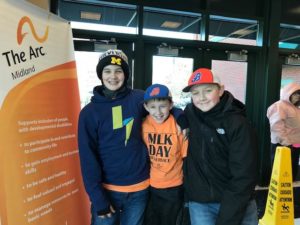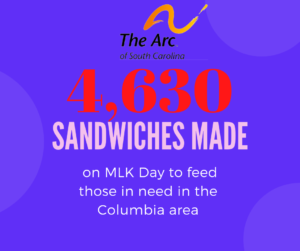By Peter Berns, CEO, The Arc
It’s no surprise that when Walmart, our nation’s largest private employer, announced plans to change the People Greeter role in its stores, a move that affects some employees with disabilities serving in that role, there was a hue and cry in the disability community and beyond. It is heartening that Walmart US President & CEO, Greg Foran, immediately stepped forward to reiterate the company’s commitment to its employees with disabilities, stating that Walmart will look at each situation individually “with the goal of offering appropriate accommodations that will enable these associates to continue in other roles with their store.” Foran further explained: “Let me be clear: If any associate in this unique situation wants to continue working at Walmart, we should make every effort to make that happen.”
As a company that prides itself on its “long-standing history of being an employer of choice for people with disabilities,” and on its 100 points score on the Disability Equality Index, these recent events provide an opportunity for Walmart to demonstrate its leadership and commitment to people with disabilities and their families. Certainly, the first order of business is to support employees with disabilities in the People Greeter role who are not able to perform the new additional responsibilities of Customer Host to transition to other jobs in the company and to actively support them in doing so. The Americans with Disabilities Act (ADA) requires no less.
At a point in time where more than 60% of people with disabilities are not employed, including 65-75% of people with intellectual and developmental disabilities, how Walmart manages the current controversy is of vital interest. Walmart’s customers are watching, as are people with disabilities and their families, disability advocacy and services organizations, academics, lawyers, the news media, and many, many other employers. The company has the opportunity to lead our nation by modeling and demonstrating best practices in employment of people with disabilities in the mainstream workforce.
Walmart can demonstrate the importance of rejecting stereotypes and misconceptions about what people with disabilities can do. True, some people with disabilities, as well as some without disabilities, may not be able to perform all of the requirements of the new Customer Host job, such as lifting 25 lbs. Yet, it is also true that many people with disabilities, including those with intellectual and developmental disabilities, will meet and exceed the minimal job requirements and perform superbly in this new role and others within Walmart stores. Walmart and other employers need be open to and accepting of the reality that an employee with a disability, with appropriate training and accommodation, can be successful in a wide variety of roles. In Walmart, after all, the former People Greeter and new Customer Host roles represent only a tiny fraction of the more than 2 million jobs nationwide.
Walmart can demonstrate that it truly is feasible for any employer to recruit, hire and retain employees with disabilities as part of a company’s overall commitment to diversity, and that the business benefits in many ways by doing so. By working collaboratively with relevant government agencies, educational institutions, and nonprofit developmental disability services, vocational rehabilitation and workforce development agencies, employers can build a robust pipeline of candidates with disabilities for all types of jobs.
Walmart, and other private sector employers that are not currently legally required to do so, could also establish voluntary systems of self-identification for job applicants and employees with disabilities, adopt disability employment goals, and annually reporting that data publicly. Today, both the Federal government, as an employer, and Federal contractors are required to have systems of self-identification and report on progress in meeting defined goals. However, these requirements don’t apply to other private sector employers, nor is the reporting made public.
Many private sector employers assume they are legally prohibited by the ADA from asking about an applicant’s disability status. Yet, as the U.S. Equal Employment Opportunity Commission has explained:
(T)he ADA does, however, provide an exception to the general rule prohibiting disability-related questions in the interview process. Under the ADA, an employer may invite applicants to voluntarily self-identify as individuals with disabilities for affirmative action purposes.1
Walmart and other private sector employers could truly be game changers in employment for people with disabilities by adopting self-identification and hiring goals, for affirmative action purposes, and then sharing and holding themselves accountable for the results.
Finally, Walmart should continue the active communication and candid dialogue it has engaged in with advocacy and social services organizations in the disability community over the past years. Walmart should share with the community the results of its efforts to place People Greeters with disabilities in other roles. It should continue and expand its efforts to work collaboratively with disability nonprofits to advance employment opportunities across the company and, as one of our country’s largest employers, across the nation.
1Recruiting, Hiring, Retaining and Promoting People with Disabilities – A Resource Guide for Employers, https://www.eeoc.gov/eeoc/interagency/upload/employing_people_with_disabilities_toolkit_february_3_2015_v4-2.pdf


 Martin Luther King Jr. Day of Service is a day to celebrate compassion for everyone in our community, and to take action to address social problems and build stronger communities. This MLK Day and throughout 2019, several chapters of The Arc and other community organizations will be developing inclusive volunteering projects that seek to address
Martin Luther King Jr. Day of Service is a day to celebrate compassion for everyone in our community, and to take action to address social problems and build stronger communities. This MLK Day and throughout 2019, several chapters of The Arc and other community organizations will be developing inclusive volunteering projects that seek to address  In Michigan,
In Michigan,  For the past three years,
For the past three years, 





